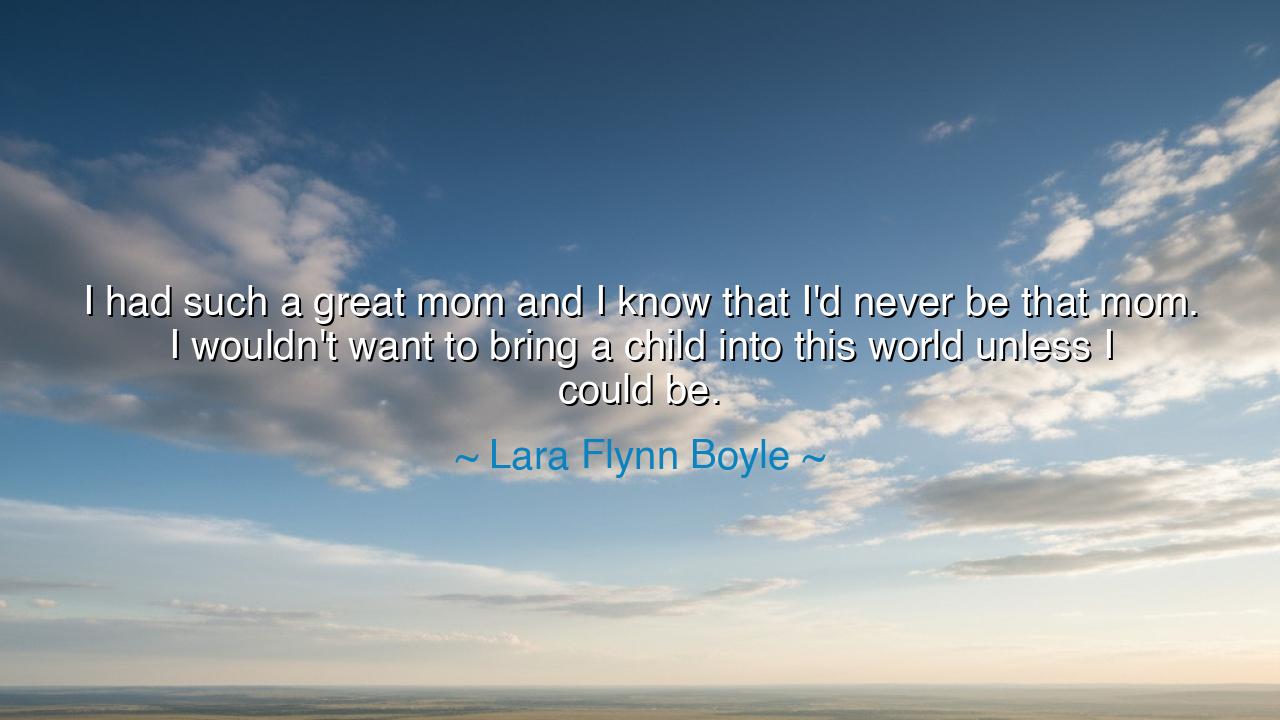
I had such a great mom and I know that I'd never be that mom. I
I had such a great mom and I know that I'd never be that mom. I wouldn't want to bring a child into this world unless I could be.






Hearken, O seekers of wisdom, and lend your hearts to the words of Lara Flynn Boyle, whose reflection bears both reverence and restraint: “I had such a great mom and I know that I'd never be that mom. I wouldn't want to bring a child into this world unless I could be.” In this quiet confession lies a truth of great humility—the recognition that love, though deeply felt, must also be guided by responsibility and self-awareness. She speaks not out of fear, but out of honor for the sacred role of motherhood, acknowledging that to nurture life demands not only desire, but readiness, wholeness, and grace.
Boyle’s words rise from the soil of gratitude. She looks back upon her own mother’s greatness, the tenderness and strength that shaped her, and realizes that such devotion cannot be imitated lightly. In an age when parenthood is often treated as a right rather than a duty, her words remind us that to raise a child is to mirror the divine act of creation itself—to shape a soul, to safeguard innocence, to give more than one takes. She does not deny the beauty of motherhood, but instead honors it so deeply that she refuses to approach it without full measure of the same love she once received.
This spirit of reverence recalls the story of Empress Maria Theresa of Austria, a mother of sixteen who ruled a vast empire with both authority and compassion. Despite her crown, she saw motherhood as her highest calling and gave her children the same care she gave her nation. Her tenderness did not weaken her; it ennobled her rule. Yet she also knew the weight of it—that to raise a child in truth and wisdom is to carry both joy and burden. Boyle’s reflection belongs to this lineage of humility: she, too, recognizes that the act of creation is not to be entered into carelessly, for it demands sacrifice, stability, and profound love.
There is also in her words a whisper of modern solitude, a consciousness of imperfection. Many feel the pull to give life yet fear their own insufficiency. This fear, though painful, can be noble if it is born from honesty and the desire not to harm. To admit “I am not ready” is not cowardice but wisdom. It is to say: I know the worth of a child, and I will not bring one into a world where I cannot give them my best self. In this humility lies moral strength, for the one who delays or refrains from creation out of care for another’s future acts from love, not lack.
Yet, Boyle’s sadness—her melancholy awareness that she may never equal her mother’s example—also reminds us of the human condition. Every generation looks upon the last with awe, believing it purer, stronger, more selfless. But this comparison, though heartfelt, can become a shadow over the heart. The lesson is not to measure ourselves against our forebears, but to carry forward their spirit—to honor them not by imitation, but by integrity. Boyle’s hesitation reveals her reverence, but her love itself proves she already bears the essence of her mother’s strength.
The wisdom of her reflection is timeless: love must be rooted in readiness. To bring forth life—whether a child, a work of art, or an idea—requires not only passion but responsibility. The ancients taught that creation without preparation breeds chaos; that to build without a foundation is to invite collapse. In this sense, Boyle’s restraint becomes a sacred discipline—a reminder that the greatest love is not always in the act of giving life, but in the wisdom to wait until one can nurture it well.
Practical guidance flows from her words. Honor those who raised you by striving to cultivate the same depth of care they gave. Do not rush the acts that shape the future—whether raising a child, starting a family, or pursuing a great calling—until your heart, mind, and spirit are united in purpose. Let love mature into readiness, and let gratitude guide your choices. For to give life is divine, but to give it well—to protect, to nourish, to guide—is the highest expression of humanity itself.
Thus, let the words of Lara Flynn Boyle echo across generations: motherhood, like all acts of creation, is sacred. To undertake it requires courage, humility, and wisdom. And even in choosing not to create until one is ready, there is a form of love as profound as creation itself—a love that honors the past, respects the present, and safeguards the future.






AAdministratorAdministrator
Welcome, honored guests. Please leave a comment, we will respond soon